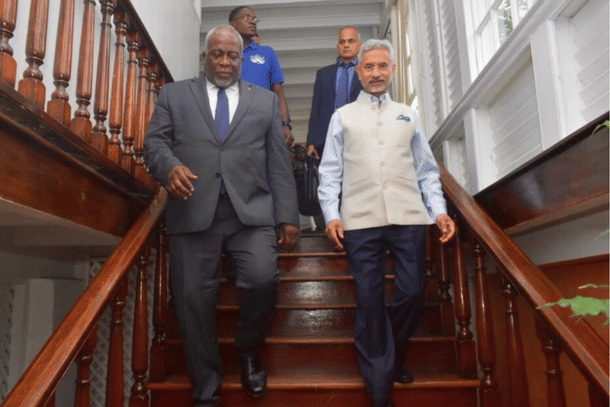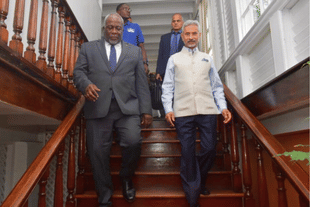World
Guyana's 'Hindu Character' Adds Complexity To India's Choices Amid Venezuela's Bid To Capture Oil-Rich Territory
S Rajesh
Dec 15, 2023, 06:06 PM | Updated 06:18 PM IST
Save & read from anywhere!
Bookmark stories for easy access on any device or the Swarajya app.


While the dispute over the territory of Essequibo, rich in oil and minerals, claimed by both Guyana and Venezuela, is unlikely to turn into something bigger in the interim because President Irfaan Ali of Guyana and Nicholas Maduro of Venezuela yesterday (14 December) agreed not to use force to escalate the matter, the issue makes it difficult for India.
India is not against Venezuela and Reliance Industries reportedly signed a deal to import oil from the country earlier this month after US sanctions were relaxed, but it is also friendly to Guyana due to the large Indian-origin population and has been eyeing a few offshore crude oil blocks there.
The Indian-origin population in the country is estimated to be 40 per cent, in which Hindus make up 31 per cent, according to a 2020 estimate. According to a report by News18, Hindus made up 37 per cent of the population of Essequibo, the region that Venezuela is threatening to take over.
The region, due to its massive oil resources, is an important part of the oil politics of the area. The dispute, while historic in nature, has flared up recently because of the discovery of oil. Guyana has an estimated 11 billion barrels. Capturing this oil-rich region will give Venezuela control over a large part of the oil produced in this part of South America.
In 2019-20, India imported crude oil worth $6.03 billion from Venezuela. Union Minister Hardeep Singh Puri, today (15 December) said that India would always buy oil from Venezuela, as long as it is allowed to.
However, it would be better for India if the territory remains with Guyana due to the following reasons-
We don't know when US sanctions could be imposed on Venezuela again. If the US chooses to do so, we would again lose a good source of crude oil due to Uncle Sam's wishes.
The discounted rates given by Venezuela to Chinese companies are unlikely to be given to India as its market opens up after the removal of sanctions.
Given Guyana is still kicking off its oil production, and India enjoys a lot of goodwill due to the fact that there is a significant Indian origin population, (both the President and the Vice-President are of Indian origin), India is likely to get better deals (preferential rates, stakes in oil fields etc).
Guyana has expressed interest in bringing over Indian oil and gas professionals as well.
US sanctions are unlikely to be imposed on Guyana as the two countries enjoy close ties. In the days following Venezuela's claims, the US Southern Command conducted military drills along with the Guyanese forces. US Secretary of State Antony Blinken has said that Guyana has the full support of the US regarding its claims to the territory.
The US company ExxonMobil is involved in oil extraction from the large offshore Stabroek block. Along with plans to auction 14 offshore oil blocks, the Guyanese government also plans to take back 20 per cent of the holdings of ExxonMobil. This could then be an area where India could partner with in exploration and production.
Also, in general, India would like to have a stable source of oil, given the Israel-Hamas war in the Middle East and the Russia-Ukraine war. While the west was uncomfortable with India's oil imports from Russia, it wouldn't be so with Guyana.
S Rajesh is Staff Writer at Swarajya. He tweets @rajesh_srn.





